| Gemstone Chart |
 Natural Beryl Natural Beryl
Beryl is a semi-precious clear gemstone which usually comes in greens, yellows, and occasionally pinks, ands various shades thereof.
Color: Green, blue, pink, yellow, red
Categories: semi-precious stone
Chemical Composition: Be3Al2(SiO3)6
Crystal Group: Hexagonal
Refractive Index: 1.577(+-.016), 1.583 (+-.017)
Hardness: 7.5
Density: 2.67-2.745
Occurrence: Austria, Columbia, Brazil, Russia, East Africa, Australia, Madagascar, South Africa, Zimbabwe, India, Pakistan, Zambia, Nigeria, U.S.A., Afghanistan
|  Natural Bi Color Tourmaline Natural Bi Color Tourmaline
Bi color tourmaline is the name given to tourmaline which displays more than one color in the same cystal.It is classified as a semi-precious stone.
Color: Green, red, yellow, orange. Brown, green, pink
Categories: semi-precious stone
Chemical Composition: (NaCa)(LI,MgFe,Al)9B3Si6(O,OH)31
Crystal Group: Hexagonal
Refractive Index: 1.624(+.005, -.005) - 1.644(+.006, -.006)
Hardness: 7-7.5
Density: 3.06 (.05, +.15)
Occurrence: East Africa, Brazil, USA, Afghanistan, Nigeria, Madagascar
|  Natural Bixbite Natural Bixbite
Bixbite is a specific kind of emerald stone known as beryl which is also known as red beryl, red emerald or scarlet emerald.
Color: Pink, Red
Categories: semi-precious stone
Chemical Composition: Be3Al2(SiO3)6
Crystal Group: Hexagonal
Refractive Index: 1.577(+-.016), 1.583 (+-.017)
Hardness: 7.5
Density: 2.67-2.745
Occurrence: Utah, U.S.A.
| 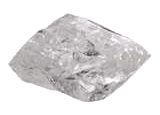 Natural Danburite Natural Danburite
Danburite is a very spiritual stone that carries a pure vibration. With a hardness of 7, danburite is quite hard and suitable for any kind of jewelry. Danburite handles easily and ordinarily offers no problems for lapidaries. It makes an especially brilliant gem because of its extreme clarity.
Color: White, yellowish, very light pink, buff colored, very light brown
Categories: semi-precious stone
Chemical Composition: calcium borosilicate
Crystal Group: Orthorhombic
Refractive Index: 1.630(+.003,-.003) - 1.636 (+.003, -.003)
Hardness: 7
Density: 3
Occurrence: Danbury, Connecticut and Russell, New York, USA; Charcas, San Luis Potosi, Mexico; Kyushu Island, Japan; Mogok, Burma and Uri, Switzerland; Madagascar.
| 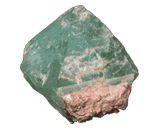 Natural Fluorite Natural Fluorite
Fluorite has a wide range of colors including yellow, blue, pink purple and green. It is an interesting and beautiful gemstone.
Color: Colorless, yellow, brown, green, blue, violet, pink
Categories: semi-precious stone
Chemical Composition: CaF2
Crystal Group: Cubic
Refractive Index: 1.43
Hardness: 4
Density: 3.18
Occurrence: Namibia, U.K., Switzerland, Nigeria, Czechoslovakia, Canada, Poland, Italy, Norway, Germany, U.S.A.
| 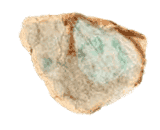 Natural Jadeite Natural Jadeite
A rare, usually green mineral of the pyroxene group. Jadeite can also occur in white, auburn, buff, or violet varieties. The most highly valued form of jade consists of jadeite.Jade has a history in China of at least four thousands years.Experts believe that, although more expensive, diamonds and gold cannot be compared with jade - jade is animated with a soul.
Color: Pure white thru pink, brown, red, orange, yellow, mauve, violet, blue, and black, to an extensive range of green and mottled green and white.
Categories: semi-precious stone
Chemical Composition: NaAl(SiO3)2
Crystal Group: Monoclinic
Refractive Index: 1.654 - 1.667
Hardness: 7
Density: 3.32
Occurrence: Northern Myanmar. Non commercial discoveries of Jadeite have also been reported in China; Russia (in the Polar Urals); Niigata, Japan; San Benito County, California, USA, and Guatemala.
| 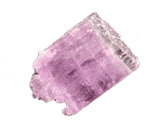 Natural Kunzite Natural Kunzite
Kunzite is the pink to light purple gem variety of the mineral Spodumene.Although kunzite is a relatively soft and delicate gem, and can fade after prolonged exposure to light, its appealing color makes it a popular gem. Small gems are seldom cut from kunzite because of its cleavage and strong pleochroism. It is rarely seen in rings, necklaces, or any other forms of jewelry where small stones are required.
Color: Pink, Lilac, Light Violet
Categories: semi-precious stone
Chemical Composition: LiAlSi2O6
Crystal Group: Monoclinic
Refractive Index: 1.660 - 1.675
Hardness: 7
Density: 3.17 - 3.19
Occurrence: Africa, Brazil, Canada, Madagascar, Mexico, Myanmar, Afghanistan, Sweden, and USA (California).
| 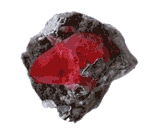 Natural Rhodochrosite Natural Rhodochrosite
Rhodochrosite is a manganese carbonate mineral with chemical composition MnCO3. The pink color of rhodochrosite is caused by the element manganese and it is formed when manganese is dissolved by ground water and combines with a carbonate material and then drips off the ceiling of caves and crevices deep underground.Rhodochrosite often forms pink and white bands. It is often carved into figurines or boxes while the tubular stalactite formations are often sliced for use in jewelry. Fine gem quality crystals are sometimes cut into gemstones for use in high end jewelry, but the more common grade is used extensively in silver and gold jewelry.
Color: Rose red, raspberry red, pink, grey, fawn, brown
Categories: semi-precious stone
Chemical Composition: MnCO3
Crystal Group: Trigonal
Refractive Index: 1.600 – 1.820
Hardness: 4
Density: 3.45 – 3.70
Occurrence: Argentina; Colorado, U.S.A.; Romania; Hungary; India; South Africa; Saxony, Chile; Peru; Mexico.
|
|
